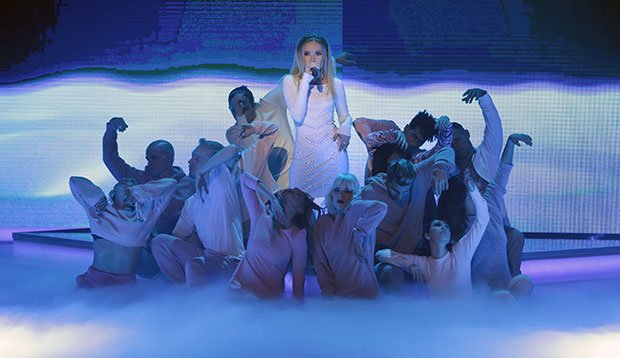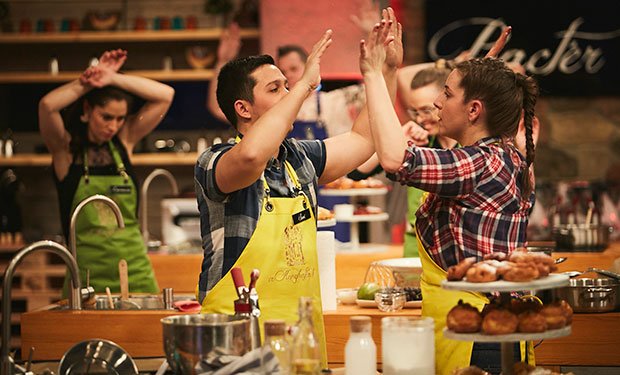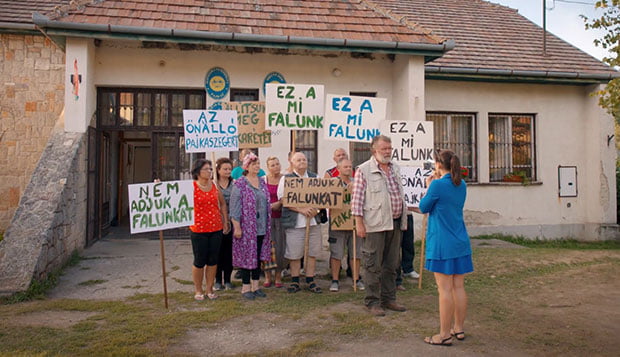RTL Klub – Hungary
Posted By Gün Akyuz On 15-08-2018 @ 8:49 am In Alerts | Comments Disabled
SCHEDULE WATCH CHANNEL PROFILE: RTL Klub remains Hungary’s top dog thanks to an aggressive original production strategy, despite intensified competition. Gün Akyuz reports.
 Overview
Overview
RTL Klub and the RTL Hungary group have retained the upper hand in Hungary’s increasingly fragmented landscape, thanks to an expanding local production strategy.
Last year RTL Klub posted an annual primetime share of 16.4% and an all-day share of 11.3% in its main 18-49 commercial target. So far in 2018 (year-to-July 22), the flagship channel pulled in a 12.9% share of viewing among 18-49s, against 10% for its main rival TV2, while the RTL group as a whole attracted an equivalent 14.3% and 13.3%, respectively.
“We remain market leaders in both,” says Péter Kolosi, deputy CEO and director of programming, although he concedes that the TV2 group has narrowed the gap in the past few years, thanks to the launch of several channels and an improved content slate. “We always said the lead we’ve had over TV2 wasn’t sustainable in the long term. Once they started to invest more in content and improve, we knew the gap would narrow.”
For RTL Klub, local primetime drama has been one of the rising stars over the past three years. Currently a key pillar in its weekly schedule in peak season, three local drama adaptations have now launched. The biggest hit so far is A mi kis falunk (Our Little Village), adapted from TV Markisa’s hit Slovakian comedy drama Horná Dolná, with season two this spring attracting a 27.6% share. The channel is now preparing its first, as-yet undisclosed, fully locally originated drama.
As elsewhere, digital developments are affecting viewing patterns in Hungary. “We’re not at the same level as Western Europe, but we’re catching up and the trends are the same,” says Kolosi. “Younger viewers are watching more and more on digital and less on linear, so all your valuable content has to be available in digital.”
To meet that challenge, this summer the RTL Hungary group relaunched its digital service RTL Most (meaning RTL Now), including a technical relaunch, in cooperation with France’s M6 group, tapping their digital platform developments.

X Factor is the top shiny-floor entertainment show in Hungary
Kolosi adds that native digital content is already happening on RTL. “We already have quite a few digital shortform shows, which are not only for RTL Most, which is mainly about catch-up.” Expected to launch soon are a number of new thematic digital channels, adding to a few already accessible through RTL Most.
For now, however, competition from global digital players like Netflix isn’t an immediate threat. One of the biggest barriers for foreign entrants is language, says Kolosi. “Hungarians really prefer to watch content in Hungarian, and all the big players, such as Netflix, are not very active in dubbing. Hungarian viewers don’t like subtitles, and it has always been the case on [linear] TV as well.”
Current schedule, original production
Kolosi says RTL Klub’s evolving content strategy has involved more risk-taking, hand in hand with the incremental growth in local production in its schedule over the past five years, as more slots are filled with new local productions for the first time, notably more local drama. “In primetime in the main seasons, practically everything is now local, compared with even five years ago,” says the exec.
One example is its increased local offer at weekends. “Five years ago we had one big shiny-floor show in the autumn season. We used to just have X Factor. This spring we also had drama on Saturday.”
Entertainment, formats
Kolosi says RTL Klub’s version of X Factor remains the number one shiny-floor entertainment show in Hungary, as well as the only one still standing. Season seven, which aired last autumn, attracted a 27.2% share and an eighth season will return this autumn.
Kolosi says that just like other international versions, RTL Klub constantly tweaks and updates the format to keep it fresh. “We’ve changed the number of live shows,” says the exec. “Our experience in Hungary is that the recorded episodes are extremely strong but the ratings go down for the live shows.”

Competition reality series Kitchen Chef has aired for seven seasons
As elsewhere, Hungarian viewers have been saturated by talent shows, including TV2’s versions of The Voice, Rising Star and its own format Megastar, but for the past two years X Factor has been the only one still on air, says Kolosi. RTL Klub’s version of X Factor has aired almost uninterrupted since 2010, with the exception of one year when it was rested and the channel launched Got Talent, in fall 2015.
Even though talent shows are no longer the “killer formats” they once were, Kolosi says he has every reason to believe X Factor season eight will still be strong, but he adds: “We’re obviously looking at other areas of shiny-floor studio-based, big-budget entertainment,” although declines to reveal details.
“Weekend primetime is when you’re going for the broadest audience possible, so it has to be for the family; it has to be big-scale; in many cases with celebrities, which is important in Hungary; and with positive values,” says the exec.
Another driver show for RTL Klub has been competition reality series Kitchen Chef, which has now aired for seven seasons. The latest this spring attracted a 17.8% share of 18-49s. The channel airs the show in spring and autumn as celebrity and ordinary contestant versions, both of which work well, says Kolosi.
Also returning to the channel this fall is competition reality show Survivor, but a launch date has not been revealed yet. The format came back to the channel last fall after an extended hiatus, says Kolosi.
RTL Klub launched the series in 2003/04, and shot two seasons back-to-back in the Dominican Republic. Last year’s version, produced in the Philippines, launched as a daily show, picking up an average 20.2% share across its run as well as significant buzz on social media among 20-somethings and teens. “It’s something we haven’t experienced for a long time,” says Kolosi, citing this a key reason for renewing the show.

A mi kis falunk (Our Little Village) was RTL Klub’s biggest local primetime drama hit
RTL Klub has also confirmed the return of gameshow Power Couple this autumn, following its successful launch two years ago. Airing as a daily show in Hungary, Kolosi says it’ll be scheduled as a four-week event, airing in the same slot as Survivor.
Although the trend for young viewers leaving linear TV is gathering pace, the exec says: “I still think that with the right show, and something that really meets the needs, demands and tastes of young audiences, you can still lock many eyeballs on to linear TV.”
The norm for shows these days is to have a 360º presence, so alongside Survivor’s linear broadcast are “all the additional things we can do in a digital space,” says Kolosi.
One disappointment, however, was RTL Klub’s version of NBCUniversal’s The Wall (A Fal). The ongoing rivalry with TV2 sparked a bitter formats row early this year, with RTL Klub claiming that TV2’s gameshow The Pyramid was effectively a copy of The Wall.
TV2’s show, which launched just ahead of The Wall, won the ratings battle, as well as significantly denting RTL Klub’s results. However, RTL Klub recovered and went on to increase its lead against its rival.
Despite its fate, Kolosi says, The Wall was the first interesting gameshow “after so many years of nothing.” Whether it will return remains undecided.
“What we can see is that gameshows are much less appealing to digital audiences and have a much shorter life in general than before, and frankly there aren’t so many interesting formats either,” he says.

Reality series Survivor will be returning this year
Drama
RTL Klub launched weekly drama three years ago, starting with Divorce (Válótársak) in late 2015, making it RTL Klub and Hungary’s first local weekly drama in a decade. The 10-part series, airing on Thursdays at 21.30, was adapted from Talpa’s Dutch original. Season three launched in early January this year, picking up a 16.4% share of 18-49s across its run.
Its second was A mi kis falunk, adapted from TV Markiza’s Horná Dolná, scheduled in the same weekday slot as Divorce. Season two launched on Saturdays at 20.00 this February. Its biggest local scripted hit so far, some episodes managed 30% shares attracting more viewers than the channel’s unscripted schedule-driver X Factor.
A third weekly series launched this spring in the Saturday slot after Horná Dolná ended its run, to give RTL Klub an uninterrupted Saturday drama slot from mid-February to mid-May for the first time. A Tanár (The Teacher), adapted by prodco Paprika from the Sony Deutschland drama Der Lehrer, nudged a 20% share of 18-49s
Elsewhere, adding to RTL Klub’s 20-year-old daily soap Barátok közt and its five-year-old local version of Berlin Day & Night, came scripted developments at sibling RTLII. The digital cable channel recorded a major success with its first locally scripted and produced telenovela, Glorious Girls. The 100-episode series ran from the end of 2017 into early 2018. This added to the recent success of telenovelas on RTLII.
Kolosi observes: “We believe that drama, in whatever form – weekly or daily – has become a very important genre for us and for the market as a whole, for linear as well as digital consumption.”
A key target for RTL Hungary, as in other countries, has been to build up local scriptwriting talent. In partnership with Paprika Studios, this May the broadcaster launched Hypewriter [1], an international scriptwriting competition to attract new talent and ideas. Kolosi was one of the jurors.
The initiative attracted more than 160 entries from 28 countries, a number of them outside CEE. The winning entry was Készhelyzet (The Butcher), a 10-part series from Andrew Hefler and Declan Hannigan, both resident in Hungary. Paprika is helping with the pilot development and the show is expected to launch in early 2019.
The competition winners aside, Kolosi says RTL Klub already has a number of other weekly drama projects in the pipeline, including its first 100% locally created and scripted project, which has yet to be revealed.
Acquisitions
Although RTL Klub’s primetime is now driven by local production in the main seasons, there’s still some room for acquisitions, such as US series. “We’ve had some successful launches this summer,” says Kolosi, citing The Good Doctor, which airs weekly on Thursdays at 21.30, sometimes in double episodes, pulling in an average 17.3% share of 18-49s.
Article printed from C21Media: https://www.c21media.net
URL to article: https://www.c21media.net/rtl-klub-hungary-3/
URLs in this post:
[1] the broadcaster launched Hypewriter: https://www.c21media.net/rtl-paprika-unveil-hypewriter-pitch-forum/
Click here to print.